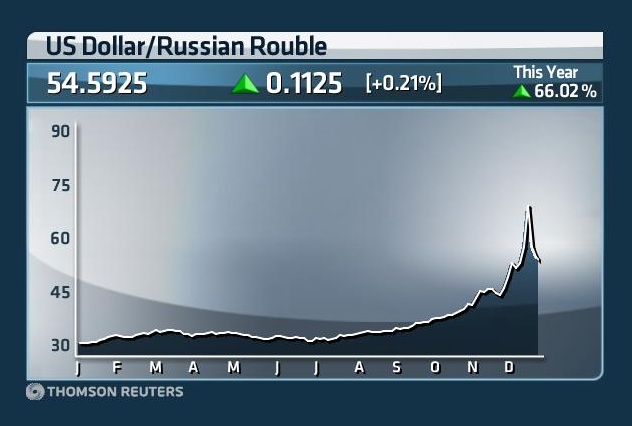Russia's currency has reached relative stability in the
run-up to Christmas compared to last week's wild ride, but currency
strategists are pondering whether there is more volatility in store for
the ruble.
The currency edged higher on Wednesday morning, trading near a two-week high against the dollar at 54.2430 by 8:00 a.m. London time. This comes after ratings agency Standard and Poor's warned late Tuesday that it could soon downgrade Russia's rating to "junk" status.
The country's central bank has aggressively tried to defend the ruble which is down 38 percent year-to-date against the dollar, amid sanctions from Western nations and the
dramatic tumble in oil prices. Foreign exchange has been sold in large quantities by the bank and it has also hiked interest rates to 17 percent which failed to stop an 11 percent slide last Tuesday — its steepest intraday fall since 1998.
Chris Weafer, a senior partner at Macro Advisory Limited, believes that the central bank is trying to stabilize the currency over the short term ahead of the Orthodox Christian holiday season in early January - coming slightly later than celebrations in Europe - when lots of Russian travel abroad.
Russian lawmakers are hoping that after the Orthodox Christmas, the situation would be a lot calmer, according to Weafer, but expects it to fall further if the price of oil drops to around $55.
"The key to all this is the oil price," he told CNBC Wednesday.
The currency edged higher on Wednesday morning, trading near a two-week high against the dollar at 54.2430 by 8:00 a.m. London time. This comes after ratings agency Standard and Poor's warned late Tuesday that it could soon downgrade Russia's rating to "junk" status.
The country's central bank has aggressively tried to defend the ruble which is down 38 percent year-to-date against the dollar, amid sanctions from Western nations and the
dramatic tumble in oil prices. Foreign exchange has been sold in large quantities by the bank and it has also hiked interest rates to 17 percent which failed to stop an 11 percent slide last Tuesday — its steepest intraday fall since 1998.
Chris Weafer, a senior partner at Macro Advisory Limited, believes that the central bank is trying to stabilize the currency over the short term ahead of the Orthodox Christian holiday season in early January - coming slightly later than celebrations in Europe - when lots of Russian travel abroad.
Russian lawmakers are hoping that after the Orthodox Christmas, the situation would be a lot calmer, according to Weafer, but expects it to fall further if the price of oil drops to around $55.
"The key to all this is the oil price," he told CNBC Wednesday.
The Central Bank of the Russia (CBR) announced even more measures on Wednesday morning, adding to its recent flurry of activity.
It detailed how much foreign currency will be made available to the
banking system, according to Reuters, with those lenders having to use
foreign loans as collateral.
Last week, amid the panic selling, the Russian finance ministry released a statement saying that it considered the ruble to be "extremely undervalued." The currency has recovered some losses since then, however, but still remains above the $45 level which it had been trading at for much of 2014.
Simon Smith, the chief economist at brokerage FxPro, believes that the currency is not yet "out of the woods," saying that reduced liquidity in the holiday season has helped firm up the price. The stabilization of Brent crude has also helped, he said in a research note on Tuesday, but still questioned whether there was scope for a full recovery.
Comparing the long-term trends and its 10 year average, economists at Capital Economics estimate that the ruble is the most undervalued emerging market currency. John Higgins, the chief markets economist at the macro-economic research firm, adds that he is skeptical of any complaints from the CBR.
"The deterioration in Russia's terms of trade that has resulted from a lower price of oil will have reduced the equilibrium level of the ruble substantially. Granted, the price of oil appears to be finding some support around $60 per barrel. But we don't expect it to rebound sharply," he said in a note on Tuesday.
Last week, amid the panic selling, the Russian finance ministry released a statement saying that it considered the ruble to be "extremely undervalued." The currency has recovered some losses since then, however, but still remains above the $45 level which it had been trading at for much of 2014.
Simon Smith, the chief economist at brokerage FxPro, believes that the currency is not yet "out of the woods," saying that reduced liquidity in the holiday season has helped firm up the price. The stabilization of Brent crude has also helped, he said in a research note on Tuesday, but still questioned whether there was scope for a full recovery.
Comparing the long-term trends and its 10 year average, economists at Capital Economics estimate that the ruble is the most undervalued emerging market currency. John Higgins, the chief markets economist at the macro-economic research firm, adds that he is skeptical of any complaints from the CBR.
"The deterioration in Russia's terms of trade that has resulted from a lower price of oil will have reduced the equilibrium level of the ruble substantially. Granted, the price of oil appears to be finding some support around $60 per barrel. But we don't expect it to rebound sharply," he said in a note on Tuesday.

Matt ClinchAssistant Producer, CNBC.com


No comments:
Post a Comment